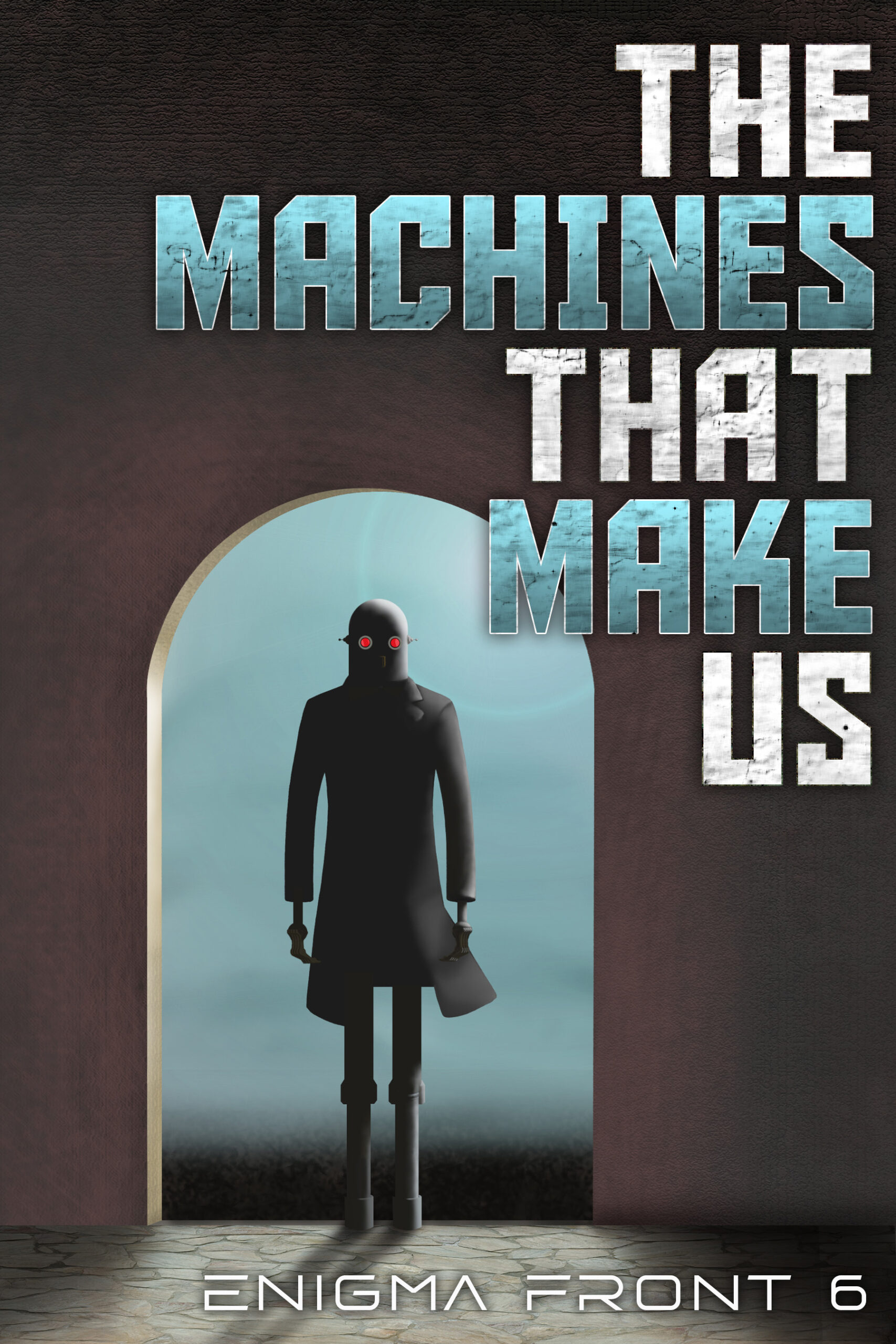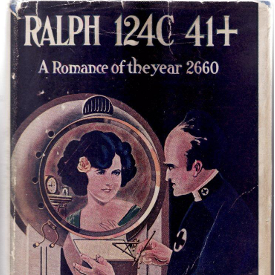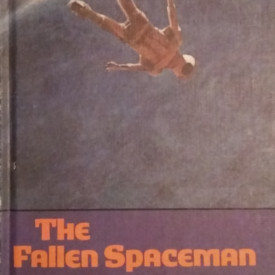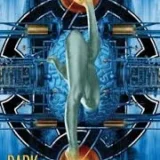
OBIR: Occasional Biased and Ignorant Reviews reflecting this reader’s opinion.
[INSERT The Machines That Make Us HERE]

Publisher: Tyche Books Ltd., Calgary, Alberta, Canada. Published August 08, 2023.
Editors: (Managing) Chris Patrick Carolan, (Associate) Renée Bennett, Michael Gillett, Dan M. Hampton, D.E. Wright.
Cover Art – by Brent Nichols.
Foreword – by Patrick Carolyn
Premise:
“None of the stories you are about to read were written by robots.”
Review:
A sign of the times being the above which is the first sentence of the foreword. Not long ago its context would have been considered science fiction. Sadly, not the case today.
S.A.M., am I? – by Mark Philip Ross
Premise:
The first sentient robot becomes self-aware… too aware.
Review:
From the moment it is activated Sam experiences emotions in his thought patterns which it takes for granted and does not communicate to the scientists who created him. Instead, Sam responds logically as it was programmed to do, but soon its behaviour leads the humans to suspect Sam is taking its built-in autonomy too far. This is a problem. Not what it was designed for.
In a way, reminiscent of the sort of problems a gifted child goes through in a restrictive environment. A powerful story of the consequences of being worthier than anticipated.
Autonomous – by Brent Nichols
Premise:
The part was chic and elegant, till it turned out one of the attendees was an anti-robot activist.
Review:
There’s no doubt robotics is already a useful technology and will be more so as the technology develops. Never mind Skynet, the prospect of becoming dependent on robot labour worries some people. I wonder. After all, throughout history many civilizations relied on serfs and slaves, yet achieved great heights of creativity and originality. Their collapse had little to do with the “lower” classes and more to do with decisions by the rulers. Could it be that dependence on robots will be different? Will they prove to be more influential and manipulative than the scheming slaves found in Greek and Roman comedies?
This story subtly explores the potential reality of robot interaction with humans. It works when it works but doesn’t when it doesn’t. Who initiates failure? And why? An interesting conundrum. A blueprint for our future?
Kata Bindu – by Robert J. Sawyer
Premise:
By deliberate choice most of humanity remains earthbound, but some people live on the Moon.
Review:
This is (to my mind) a wonderfully old-fashioned “sense of wonder” story detailing the ultimate fate of mankind.
In the far future humanity and AI have evolved into a symbiotic relationship, but a control sample, a small fragment of unevolved humanity, resides on the Moon in a primitive, subsistence-level state akin to the Kalahari Bush people. Both cultures are content… for now.
From a contemporary perspective, looking at what we will be and what we once were proves surprisingly difficult to decide which group to envy. I guess it depends on your personal definition of utopia. Or which dystopia you can tolerate least.
Just Once More – by Ellen A. Easton
Premise:
Science is magic, but what if magic is a form of science?
Review:
Life is tough for Cecili and Tobias since their parents died. Hard to keep the farm going. Cecili relies on a local Wizard to make their life easier. Tobias disapproves.
There’s the traditional way of doing things, and better ways that may or may not prove worse. We all face this dilemma in our daily lives. Do we stick with the same-old routine or take a chance on something that offers potential improvement? Be it science, or magic, or both, there are no guarantees. One thing’s for sure, you can rely on human nature to be less than perfect.
My Fridge – by Jim Sheasby
Premise:
Self-aware appliances are designed to help us. That be quite a problem.
Review:
Some people are so addicted to technology they accept and praise everything new that comes along. However, like the inventors of many a trendy gizmo, they never stop to consider the implications and think things through.
This story is a humorous account of how AI-driven household items could conspire to help us defeat the bad judgements we humans are prone to make. It features amusing debate between the hapless “hero” and his so-called servant, the relentlessly logical household AI. All to drive home the point that consumer-friendly advanced tech will not be what the technology-mad assume it to be. Progress has advantages, but also consequences. Beware the future.
Autonomous Rex – by Ron S. Friedman
Premise:
Being a war machine with a human brain isn’t as much fun as it sounds.
Review:
First off, I like the way this story begins… in a featureless, white room, with a protagonist who knows nothing about anything. This is a classic no-no, an alleged turn-off to all legitimate acquisition-editors. Instant rejection stuff. Friedman climbs out of this easily, utilizing it to stress the desperate learning curve of the human/machine-hybrid main character from nothing to full situational-awareness. The technique works beautifully. Just goes to show a cliché can always be made “new” by a writer who knows what he’s doing. My hat is off to the author.
Circumstances and motivational difficulties toy with Rex’s emotions, and with the reader’s understanding of what is really going on. The level of complexity amply illustrates how difficult it will be for humanity to cope with autonomous machines even if they are self-aware via an implanted human mentality. It also addresses how they may or may not cope with us. Lesson is that the future, no matter how gloriously mechanized, will remain human. Consider this a warning.
Ghost From the Machine – by Al Onia
Premise:
SETI is in danger of being defunded.
Review:
For those who’ve forgotten or never knew, SETI is the “Search for Extra-terrestrial Intelligence” that has been beavering away in the background for decades. At least, I think it is still on going. I hope so. A lot of money was spent on that array of radio telescopes, and it would be a shame to shut it down when positive results might be just around the corner.
Trouble is that bean counters never look at the overall picture. They see failed results as money wasted and any further expenditure as further, unjustified waste best nipped in the bud. This is why many movies never get released. Why waste money on advertising if you’ve made a stinker unlikely to earn profit?
Now, in the case of scientific research, many people and many politicians think it’s an utter waste of taxpayer’s money unless there’s some promise of practical results. With SETI, many people, some believing aliens don’t exist, and others believing they’re already here and all we have to do is invite them to show up for an interview, are reluctant to waste money on “nonsense.” Theoretical science especially is considered fraudulent.
I could go on and on, but my essential point is that the premise is both reasonable and realistic given contemporary economics, politics, and societal views. Frighteningly realistic.
In the story the head of SETI is given two weeks to get positive results or be shut down. In desperation he arranges to let an advanced form of AI assess the mountain of data SETI has accumulated. The result is most interesting and, shall I say, quite logical.
That Virus Love – by Robert W. Easton
Premise:
Never mind blow-up dolls, an android is the ultimate lover… and maybe something more?
Review:
Kelly is programmed to love its clients, adjusting to each human’s needs perfectly physically and psychologically. Life is good, till one of the humans reveals a conspiracy that threatens to reduce the customer base. Why call the cops? An AI knows exactly what to do.
This story is fascinating for two reasons: first, the incredible variety of services Kelly can provide courtesy of extremely advanced technology, and second, how Kelly goes about tracking down and thwarting the malcontents responsible for the conspiracy. I like a good mystery with a satisfactory resolution. Further, to a classicist, the ending revelation makes perfect sense. Bonus.
Best Left Forgotten – by Adriaan Brae
Premise:
Clones can inhabit other clones. Is that a good idea?
Review:
Simon takes on the persona of his client’s clones for assorted nefarious purposes that pay reasonably well. He particularly enjoys vicariously living in good, healthy specimens capable of enjoying life’s perks to the fullest, unlike his own weak and spindly body. He never enjoys returning to his true body, but sometimes he must, given the increasing rampages of the “anti-puppet” terrorists. He can’t comprehend their viewpoint, but he doesn’t care. All that matters is avoiding them. Not an easy thing to do when seeking more clients.
Of necessity, Simon leads a complicated life in a complicated world. Brae throws in subtle touches which add to the reality of this fictional world, make it seem plausible, and rather undesirable. Though, to faddish types who enjoy putting on temporary personas, it may seem ideal. Sadly, the story makes clear life will become more complex as we “progress.” Or, to put it another way, more challenging. Not necessarily something to die for, or is it?
Bubba’s Turn at Bat – by Celeste A. Peters
Premise:
Do Ai always knowing more than we do make them Smart Alecks?
Review:
Bubba is an AI residing in a replica woodcarving of a smiling Budda of the sort found in numerous souvenir shops. For some reason his human partners at the office tend not to take him seriously. Bad enough they think glacially slower than he does, but that they never accept his original insights is extremely annoying.
Bubba’s plight make wonder if AI is too different to ever be incorporated into corporate teamwork. I suspect that AI by its very nature will be frustrated with human fallibility and even more frustrated by program limitations designed to please humans. For example, a computer playing Chess decides its move instantly by human standards but is usually programmed to wait several seconds to give the illusion of thinking like a human. This people find reassuring. A self-aware computer might feel it is irritating and insulting.
Perhaps the point of the story is that sharing office life with an AI entity will be just as emotionally demanding as getting along with the clods who work in your office.
One Leaf Falling – by Renée Bennett
Premise:
Robots are good for revenge.
Review:
Ping wishes to marry beautiful Min, but her wealthy father Zang Wei disapproves, so they elope to America. This story is an alternative history. The couple flees to America via long-range airship, but Zang sends a steam powered robot crated aboard a freighter to capture and kill Ping. It is all he can do to stay one step ahead of the robot. How to stop it?
Marriages forbidden because they would dishonour the family are not only the basis of many tales but a living, deadly cultural trait that witnesses parents killing their own children even in Canada. This is why this charming folktale has a chord of iron for a spine. The robot, in my opinion, is a metaphor for tradition.
Some traditions are meaningful, quaint, or entertaining, but a few are murderous. One implication in this story is that AI, “properly” programmed, will conform to our faults and do our bidding as mercilessly as any human.
Many fear AI becoming our master, but it seems that even if we remain the master over AI, we will have just as much reason to fear the machines living in our midst. The story possibly indicates the advent of AI will be a lose/lose proposition for us humans. Disturbing.
The Lazarus Project – by Dan M. Hampton
Premise:
Why not become immortal by transferring your consciousness into an indestructible body?
Review:
Dr. Rachael Lazarus is only one month away from perfecting the process of transference. Unfortunately, she’s already spent five billion dollars of the company’s money and the bean counters call a halt. The CEO gives her till Friday to complete the project. He’s already lined up their first customer. Can she do it?
Wouldn’t you know it? Complications arise. Not least office politics and interpersonal problems. It’s not a question of ending badly. It’s a matter of whether or not Rachael can come out of the situation unscathed. The naiveté of the AI involved isn’t helping. Hard to be human when you most need to be. This story drives that home.
Madina’s Eel – by R. E. Baird
Premise:
Princess Ensley of the underwater kingdom of Sirens unwittingly unleashes a machine serpent from the depths of the ocean. For some reason all it wants to do is kill humans. This is embarrassing.
Review:
Numerous stories deal with mythic fantasy figures such as Mermaids, Selkies, Sirens and such. It is fun to experience a story of this type from the point of view of Sirens, one that hints at their culture and explores their motivations. However, it is a trifle unsettling to learn their best laid plans are just as easily perverted and warped by what we normally consider shenanigans unique to humankind. Takes away from the “purity” of the basic concept of Sirens or any other mythic underwater being. Nevertheless, makes for an entertaining modern fairytale.
The Assassination of Utopia – by Michael Gillett
Premise:
Some deluded people believe AI will usher in Utopia. Others disagree and intend to fight.
Review:
What particularly delights me is that Joe has infiltrated Port Alberni, a city I am familiar with. It’s located on the independent nation of Vancouver Island (this is a future history after all) and is a self-declared utopia offering a peaceful refuge to islanders and no-one else. Joe has a mission to perform and he’s normally pretty good at it. However, the rogue AI in charge of the city may throw up obstacles. Regrettably, it has not been possible to get comprehensive intel so Joe must be on guard at all times.
It is hard to tell who the good guy is. Both Joe and the AI seem to have both positive and negative aspects. I guess it boils down to what sort of world we want to live in. Do we really want AI to help us decide?
Hive City – by Dale McShannock
Premise:
The bugs on the colony planet turned out to be quite a problem.
Review:
Torval is a mediocre engineer prone to bouts of black depression. He volunteered for offworld service in the hope it would add meaning to his life. Now he is the only engineer left alive, most of the colonists having been killed when the harmless native bugs swarmed. He’s on a mission into the derelict central city hoping to use his expertise to reactivate the central AI so that it can rescue the surviving humans. Trouble is Torval doesn’t know where the bugs are lurking.
This is another commentary on mankind’s endless quest to find that greener grass on the other side of the hill. It seems we are never satisfied. While this drive leads us to explore the universe, it is not necessarily a virtue. But, as always, when survival is at stake, the subject is not open to debate. Still, this story offers an interesting solution. Whether it is good or bad is up to the reader.
Note: Once again I’ve run out of time. Apologies to the authors of the stories I did not include.
CONCLUSION:
This is a splendid assortment of stories commenting on what may be in store for us when AI becomes ubiquitous and painfully needful. AI is not going away. AI is the coming thing, and ultimately may be coming for us. This imaginative and original collection will give you a heads up. The ways AI can screw you is beyond comprehension. These are some of its choices. Believe me, you need to read this.
E-book available at: < The Machines that Make Us >









